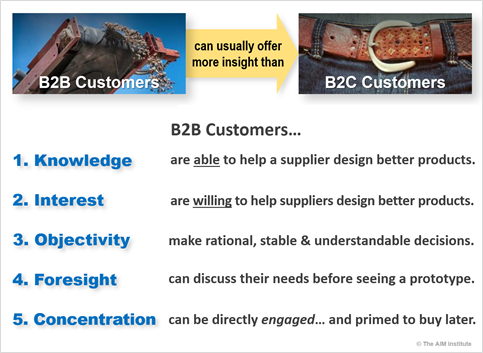1. Advantages of B2B over B2C in new product development
You can learn more from your business customers due to these 5 characteristics they share.
B2B customers usually behave very differently than B2C customers. Imagine how much more depth you could have with a B2B customer about a conveyor belt… vs. an end-consumer about a dress belt.

When it comes to market-focused innovation, these differences can be enormous advantages for you, the supplier. There are five traits that matter most:
- Knowledge: B2B customers have high knowledge when their jobs require much training and they spend a lot of time thinking about this part of their job. If these customers have high knowledge, they’re able to help you innovate on their behalf.
- Interest: B2B customer interest is high when your offering can impact their business success, leading to individual recognition and reward at the customer. Customers with high interest are willing to help you innovate for them.
- Objectivity: B2B customer objectivity is high when multiple people are involved in the buying decisions, and when they’re held accountable to procedures, policies and superiors. High customer objectivity lets you understand their needs in logical, stable terms.
- Foresight: B2B customers can often imagine and predict the impact of an offering before they see it, and then measure economic results when they do begin using it. Customers with high foresight can tell you what your offering should do before you develop it.
- Concentration: A highly-concentrated market segment is one in which a few large customers represent most of the market’s buying power. These customers are easy to identify and reach when you want to understand their needs.
To see how you can use these B2B advantages in your voice-of-customer work, download the e-book, Reinventing VOC for B2B. The next BlueHelp article, The B2B Index, shows how you can measure "how B2B" your target market segment is.
Also check out the 2-minute video, Understand your B2B advantages, part of the B2B Organic Growth video series by Dan Adams.
Keywords: B2B, business to business, business customers, B2C, business to consumer, consumer goods, knowledge, objectivity, interest, objectivity, foresight, market concentration
